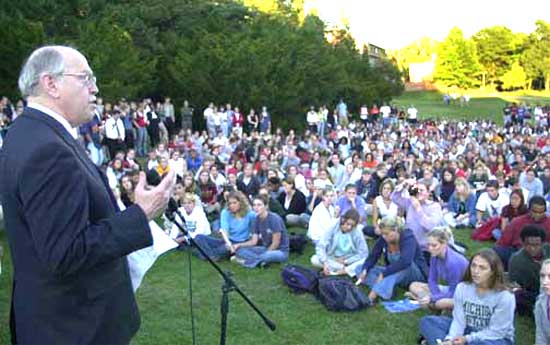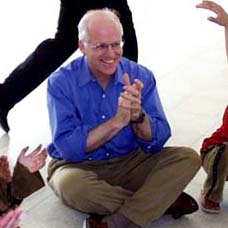2006.10.19: October 19, 2006: Headlines: Figures: COS - Peru: Economics: Food Aid: DesMoinesRegister.com: Peter McPherson says: Budget deficits will mean the next U.S. farm bill could have less money for food assistance programs to Africa
Peace Corps Online:
Directory:
Peru:
Special Report: MSU President and Peru RPCV Peter McPherson:
February 9, 2005: Index: PCOL Exclusive: RPCV Peter McPherson (Peru) :
2006.10.19: October 19, 2006: Headlines: Figures: COS - Peru: Economics: Food Aid: DesMoinesRegister.com: Peter McPherson says: Budget deficits will mean the next U.S. farm bill could have less money for food assistance programs to Africa
Peter McPherson says: Budget deficits will mean the next U.S. farm bill could have less money for food assistance programs to Africa

McPherson said there hasn't been much discussion about the amount of food aid needed in the farm bill, but the debate will begin in earnest next year when the 2007 farm law is written. It has long been a goal of U.S. food assistance to reduce poverty and hunger, McPherson said, but the program also has a goal of reducing U.S. crop surpluses, among other goals. "Iowa farmers have an interest in the debate because it will concern how their commodities are used" for food assistance, said McPherson, the former president of Michigan State University who was a Peace Corps Volunteer in Peru in the 1960s.
Peter McPherson says: Budget deficits will mean the next U.S. farm bill could have less money for food assistance programs to Africa
Food aid money for poor in Africa may dip
Panel in Des Moines hears about likely budget deficits in the U.S. farm bill.
By JERRY PERKINS
REGISTER FARM EDITOR
October 19, 2006
Budget deficits will mean the next U.S. farm bill could have less money for food assistance programs to Africa, Peter McPherson, who co-chairs the Partnership to Cut Hunger and Poverty in Africa, said Wednesday.
"There's a need for more money, but unless we look at the efficiencies of how it is spent, it will be difficult to get that money out of Washington," McPherson said at a panel discussion on hunger and poverty in Africa that was held at the Marriott Hotel in conjunction with World Food Prize activities.
McPherson said there hasn't been much discussion about the amount of food aid needed in the farm bill, but the debate will begin in earnest next year when the 2007 farm law is written.
It has long been a goal of U.S. food assistance to reduce poverty and hunger, McPherson said, but the program also has a goal of reducing U.S. crop surpluses, among other goals.
"Iowa farmers have an interest in the debate because it will concern how their commodities are used" for food assistance, said McPherson, the former president of Michigan State University who was a Peace Corps Volunteer in Peru in the 1960s.
"Iowa farmers have always been proud of their contribution to reducing world hunger," he said. "Farmers feel that they have an occupation, but they also feel that they have a mission, to feed the world."
Spending on food assistance programs in the current farm bill has been stagnant or declining, said Emmy Simmons, co-chairwoman of the partnership.
The 2002 farm bill's emergency and development assistance title has spent between $1.6 billion and $1.9 billion a year on food assistance, she said, about the same amount as what is spent on the U.S. Department of Agriculture's breakfast program for children.
Simmons said the United States provided food aid to Europe after World War II using surplus U.S. crops.
After Europe regained its feet economically, U.S. food surpluses were directed to Asia and South America, she said.
In recent years, more assistance has been sent to poor African countries where civil strife, drought, infertile soils and political upheaval have crippled food production.
In the 1950s, food aid represented 20 percent of U.S. exports, Simmons said. Today, it makes up about 4 percent of U.S. exports.
Ousmane Badiane of the International Food Policy Research Institute said African food production has increased in recent years but still lags the peak hit in the 1960s.
More food production is needed, said Badiane, a native of Senegal. Thirty percent of the children in sub-Saharan Africa remain malnourished.
Food aid should be used to boost economic growth, he said, so African countries can have the same type of economic development that made food aid to Europe, Asia and South America unnecessary.
Pedro Sanchez, World Food Prize laureate in 2002 for his work in African agriculture, said more money needs to be spent on agricultural development projects in Africa.
It costs $400 in imported food to sustain a poor African farmer and his family, he said. It costs $40 to give that farmer the basic inputs he needs to produce enough food to feed himself and his family.
"Our job is to see that food aid is made obsolete," said Sanchez, director of tropical agriculture at the Earth Institute at Columbia University.
When this story was posted in October 2006, this was on the front page of PCOL:





Peace Corps Online The Independent News Forum serving Returned Peace Corps Volunteers
 | Harris Wofford to speak at "PC History" series
Senator Harris Wofford will be the speaker at the 4th Annual "Peace Corps History" series on November 16 sponsored by the University of Maryland at Baltimore County (UMBC) and the Maryland Returned Volunteers. Previous speakers in the series have included Jack Vaughn (Second Director of the Peace Corps), Scott Stossel (Biographer of Sargent Shriver), and C. Payne Lucas (President Emeritus of Africare). Details on the time and location of the event are available here. |
 | Chris Dodd's Vision for the Peace Corps
Senator Chris Dodd (RPCV Dominican Republic) spoke at the ceremony for this year's Shriver Award and elaborated on issues he raised at Ron Tschetter's hearings. Dodd plans to introduce legislation that may include: setting aside a portion of Peace Corps' budget as seed money for demonstration projects and third goal activities (after adjusting the annual budget upward to accommodate the added expense), more volunteer input into Peace Corps operations, removing medical, healthcare and tax impediments that discourage older volunteers, providing more transparency in the medical screening and appeals process, a more comprehensive health safety net for recently-returned volunteers, and authorizing volunteers to accept, under certain circumstances, private donations to support their development projects. He plans to circulate draft legislation for review to members of the Peace Corps community and welcomes RPCV comments. |
 | He served with honor
One year ago, Staff Sgt. Robert J. Paul (RPCV Kenya) carried on an ongoing dialog on this website on the military and the peace corps and his role as a member of a Civil Affairs Team in Iraq and Afghanistan. We have just received a report that Sargeant Paul has been killed by a car bomb in Kabul. Words cannot express our feeling of loss for this tremendous injury to the entire RPCV community. Most of us didn't know him personally but we knew him from his words. Our thoughts go out to his family and friends. He was one of ours and he served with honor. |
 | Chris Shays Shifts to Favor an Iraq Timetable
In a policy shift, RPCV Congressman Chris Shays, long a staunch advocate of the Bush administration's position in Iraq, is now proposing a timetable for a withdrawal of American troops. How Mr. Shays came to this change of heart is, he says, a matter of a newfound substantive belief that Iraqis need to be prodded into taking greater control of their own destiny under the country’s newly formed government. As Chairman of the House Government Reform subcommittee on national security, he plans to draft a timetable for a phased withdrawal and then push for its adoption. A conscientious objector during the Vietnam War who said that if drafted he would not serve, Chris Shays has made 14 trips to Iraq and was the first Congressman to enter the country after the war - against the wishes of the Department of Defense. |
 | Peace Corps' Screening and Medical Clearance
The purpose of Peace Corps' screening and medical clearance process is to ensure safe accommodation for applicants and minimize undue risk exposure for volunteers to allow PCVS to complete their service without compromising their entry health status. To further these goals, PCOL has obtained a copy of the Peace Corps Screening Guidelines Manual through the Freedom of Information Act (FOIA) and has posted it in the "Peace Corps Library." Applicants and Medical Professionals (especially those who have already served as volunteers) are urged to review the guidelines and leave their comments and suggestions. Then read the story of one RPCV's journey through medical screening and his suggestions for changes to the process. |
 | The Peace Corps is "fashionable" again
The LA Times says that "the Peace Corps is booming again and "It's hard to know exactly what's behind the resurgence." PCOL Comment: Since the founding of the Peace Corps 45 years ago, Americans have answered Kennedy's call: "Ask not what your country can do for you--ask what you can do for your country. My fellow citizens of the world: ask not what America will do for you, but what together we can do for the freedom of man." Over 182,000 have served. Another 200,000 have applied and been unable to serve because of lack of Congressional funding. The Peace Corps has never gone out of fashion. It's Congress that hasn't been keeping pace. |
 | PCOL readership increases 100%
Monthly readership on "Peace Corps Online" has increased in the past twelve months to 350,000 visitors - over eleven thousand every day - a 100% increase since this time last year. Thanks again, RPCVs and Friends of the Peace Corps, for making PCOL your source of information for the Peace Corps community. And thanks for supporting the Peace Corps Library and History of the Peace Corps. Stay tuned, the best is yet to come. |
 | History of the Peace Corps
PCOL is proud to announce that Phase One of the "History of the Peace Corps" is now available online. This installment includes over 5,000 pages of primary source documents from the archives of the Peace Corps including every issue of "Peace Corps News," "Peace Corps Times," "Peace Corps Volunteer," "Action Update," and every annual report of the Peace Corps to Congress since 1961. "Ask Not" is an ongoing project. Read how you can help. |
Read the stories and leave your comments.

Some postings on Peace Corps Online are provided to the individual members of this group without permission of the copyright owner for the non-profit purposes of criticism, comment, education, scholarship, and research under the "Fair Use" provisions of U.S. Government copyright laws and they may not be distributed further without permission of the copyright owner. Peace Corps Online does not vouch for the accuracy of the content of the postings, which is the sole responsibility of the copyright holder.
Story Source: DesMoinesRegister.com
This story has been posted in the following forums: : Headlines; Figures; COS - Peru; Economics; Food Aid
PCOL35006
06



















